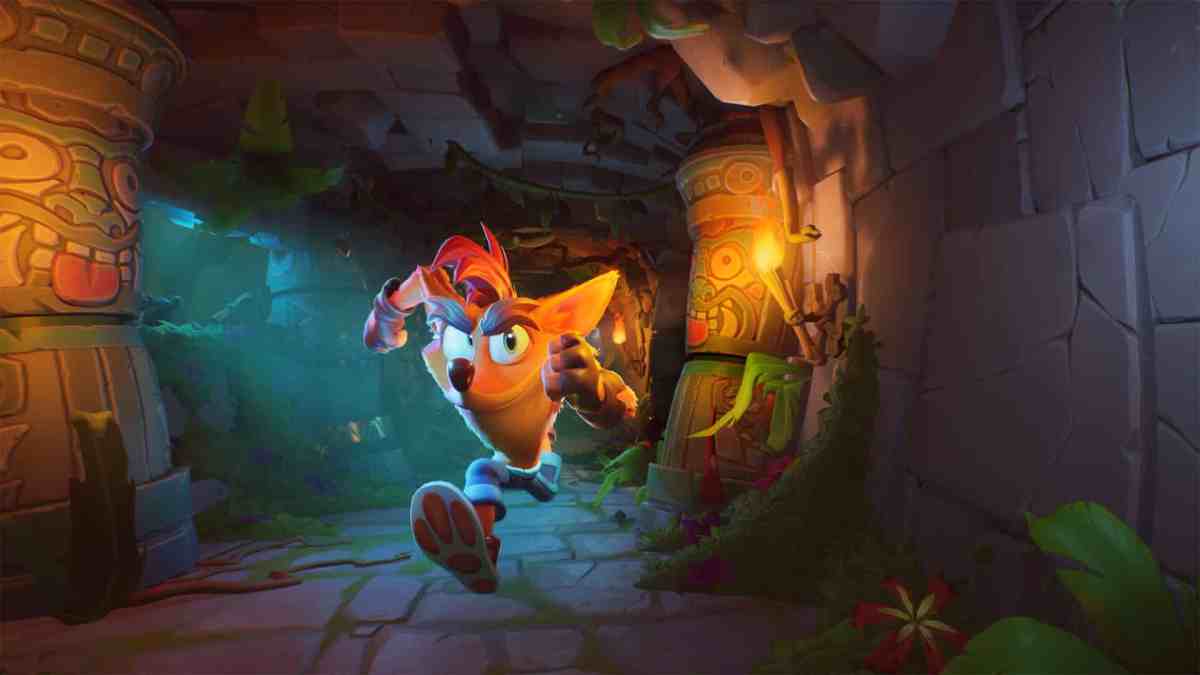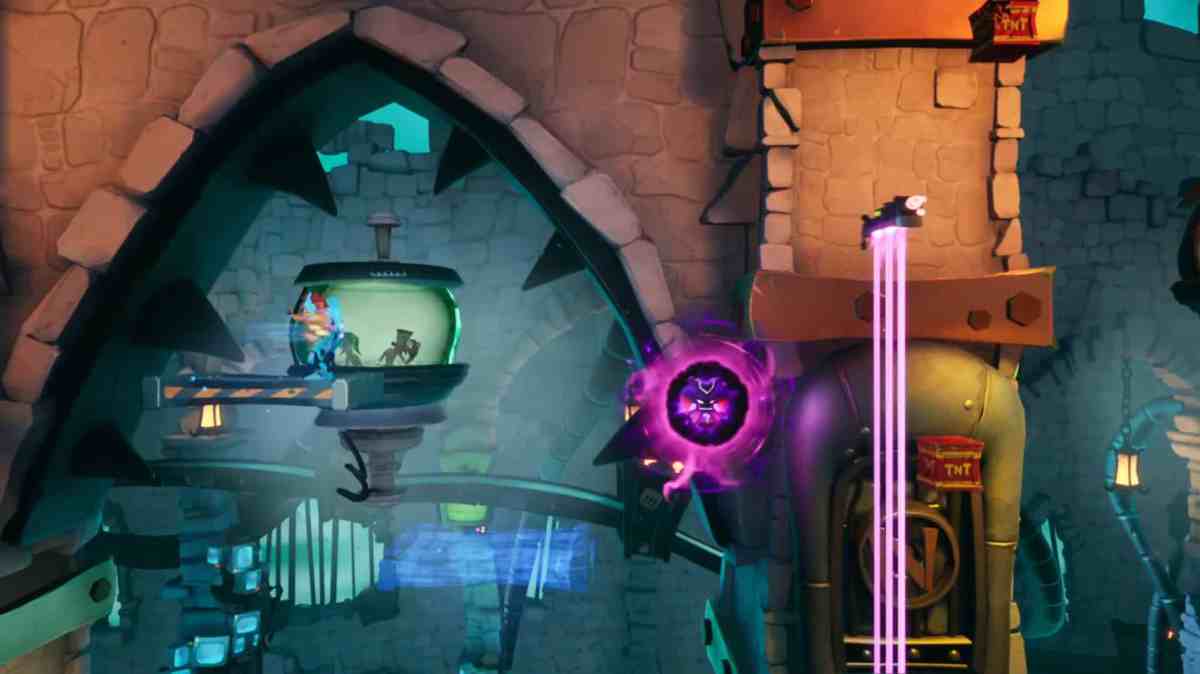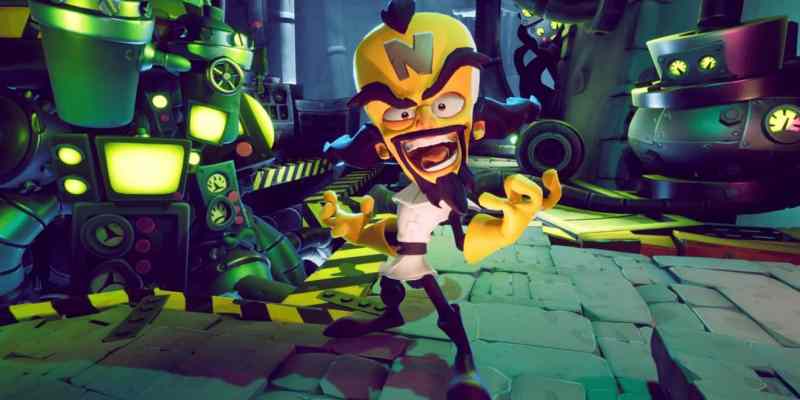There’s a lot going on in Crash Bandicoot 4: It’s About Time that I truly love. Developer Toys for Bob has clearly taken a deep love and understanding of Naughty Dog’s original trilogy and created a sequel that carries so many of those original pillars into a modern 2020 package. There’s a great sense of style, a lot of playful and creative level design, and a metric ton of interesting secrets and unlockables. But perhaps most impressive are the many ways in which the game scales in difficulty to ensure that it remains wonderfully tough, but always fair… that is — until it isn’t.
The first decision that I appreciate is the inclusion of two different modes, Modern and Retro. Retro plays like the classic PS1 Crash trilogy — you start each stage with three lives, and once those are up, you need to start over from the beginning of the level. You can gain an extra try by collecting 100 Wumpa Fruits, but that’s it. However, before you even make this decision, the game recommends that you play on Modern, which removes the concept of lives as obstacles to your progression. As long as you reach a checkpoint, you’ll never be tossed back to the very beginning, no matter how high your death counter reaches. And if you’re anything like me, it will reach great heights.
And then there’s the implementation of the checkpoint system itself. On your first run through a level, checkpoint boxes are sprinkled at a few spots throughout a stage. You generally have to complete a pretty lengthy series of challenges before you hit one. But if you start dying on a specific segment enough times, the game will adjust and create a new checkpoint box somewhere in between the original two, meaning that you don’t have to survive as long in order to reach a new progress marker. Likewise, after enough deaths, you’ll spawn with an Aku Aku mask that allows you to take an extra hit before dying.

All of this makes for an accessible and scalable difficulty that should allow more players to be able to complete the stages in Crash Bandicoot 4, while still maintaining a challenge that makes the whole thing feel rewarding. It also cuts down on having to continually replay a massive chunk of the level that you’ve already mastered, only to die once again at the part you’re having trouble with. It reminds me of Capcom’s cleverly hidden adaptive difficulty in Resident Evil 4, which was pointed out to me by Mark Brown in this excellent installment of Game Maker’s Toolkit. Depending on how well you were playing, things like enemy aggression, ammo drops, and damage received and dealt would be tweaked behind the scenes in real time. This was in an effort to keep the experience tense without ever becoming frustrating.
And that’s really what the genius of Crash Bandicoot 4 is all about. It simultaneously caters to folks who aren’t masochists while also rewarding those who really do want to show off expert play. Each stage has a Gem that can only be unlocked by completing it with three or fewer deaths, which creates a retro-style challenge on each level for those who want to partake. I really do appreciate the scalability across most of the game as a whole.
But the keyword there is most, because while I felt like the challenge was tough but fair throughout 99% of Crash Bandicoot 4, all of that got tossed out the window once I hit Cortex Castle, the penultimate stage in the main campaign. Any semblance of skill I thought I had acquired throughout the adventure was torn to shreds as I died dozens upon dozens of times in the back section of a level that wasn’t even all that long — honestly, a clean run would probably take less than five minutes to complete.
Cortex Castle starts off with a nice, manageable challenge. A chunk where you use the Lani-Loli mask to phase platforms and obstacles in and out of existence as you hop over bottomless pits. A bit with the Kupuna-Wa mask where you slow down time so you can use spinning saw blades as viable platforms before they return to their regularly scheduled whirling discs of death. At about the halfway point there’s a tough-as-nails bonus section, but like all of those that have come before, it’s entirely optional.

There are a few more sections that are difficult but certainly manageable. You don the Akano mask and use it to spin across large distances, all the while occasionally switching back to your regular character to avoid instantly igniting any TNT boxes. And then there’s a small section where you need to wear the Ika-Ika gravity mask to oscillate among walking on the floor, walking on the ceiling, and oftentimes floating somewhere between the two in order to avoid a slew of laser traps. Again, all of this is tough, but firmly rooted in what you’ve learned throughout the entirety of the game leading up to this, so overcoming the challenge feels wonderfully earned.
But just past here is where things quickly begin to crumble apart. The final sprint of the level is a lengthy stretch of bottomless pit that tasks you with making countless precise jumps, bounces, and slides, while constantly grabbing the four Quantum masks and juggling between their various powers. While I had become accustomed to each mask individually throughout the game — which is what the first part of the stage was testing me on — this was the first time where I was forced to quickly toggle between several of them back to back with virtually no room for error.
I just watched a clean run of this level on YouTube and was savagely humbled to discover this section only takes about a minute to complete. Because for me, as I saw my death counter creep ever closer to triple digits, (My previous high death total for a single stage was under 20.) I genuinely thought that I might never get past this level. Despite loving platformers ranging from the NES games of my childhood, to modern classics like Celeste, I just couldn’t form the proper communication channel between my brain and my fingers when it came to juggling all of those different mask powers and mechanics.
Perhaps even more discouraging is the fact that about halfway through this section is the VHS Flashback Tape, a single collectible placed in the back half of each stage that needs to be grabbed on your first run through without dying in order to unlock a bonus level. Don’t worry, I’ve already come to terms with the fact that I’m never going to collect this one.
But again, thanks to Crash Bandicoot 4’s liberal checkpoint system in Modern mode, I was able to pop back in at the start of this tortuous segment after every death without having to replay the entire thing. Eventually, through a mixture of stubborn memorization and genuine dumb luck, I made it through this stretch and landed on solid ground right in front of the exit. Seeing the game’s bubbly font read “LEVEL COMPLETE!” while Crash did his patented break dance didn’t bring me a sense of satisfaction or accomplishment, but rather a general air of overwhelming disappointment that I hit this wall 99% of the way through an otherwise expertly paced adventure.
Crash Bandicoot 4: It’s About Time is a great game. Cortex Castle can go straight to hell.
